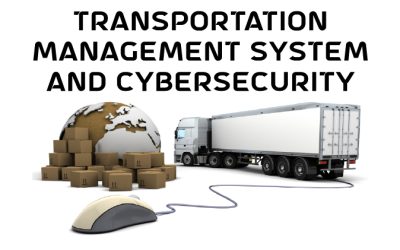
In today’s fast-paced logistics industry, technology is the backbone of efficiency, visibility, and scalability. One of the most crucial digital tools driving supply chain operations is transportation management software (TMS). However, as businesses increasingly rely on strengthening cybersecurity in TMS platforms to streamline logistics, the risks of cyber threats have grown exponentially. Protecting logistics data is no longer optional—it is a necessity.
The Role of TMS in Modern Logistics
Transportation management software is essential for optimizing freight movement, enhancing route planning, and ensuring real-time shipment tracking. The right TMS solution can improve on-time deliveries, lower operational costs, and enhance customer satisfaction. However, this growing dependence on digital logistics platforms has also made them prime targets for cybercriminals. To maintain seamless operations, logistics providers must prioritize cybersecurity in their TMS platforms.
The Rising Cybersecurity Threats in TMS
TMS platforms handle massive volumes of sensitive data, including freight details, customer records, supplier contracts, and financial transactions. Unfortunately, this valuable data makes them a lucrative target for cyberattacks. By 2025, cybercrime damages are expected to surpass $10.5 trillion annually, according to Cybersecurity Ventures. A single security breach could result in financial losses, legal consequences, and reputational damage for logistics companies.
Key Cybersecurity Risks in TMS
-
Data Breaches
Unauthorized access to TMS data can disrupt supply chain operations and erode trust. Cybercriminals often exploit weak passwords, outdated software, or unprotected networks to infiltrate systems and steal critical information.
-
Ransomware Attacks
Malicious software can encrypt TMS data and block access to essential logistics functions until a ransom is paid. Ransomware attacks are becoming more sophisticated, targeting vulnerabilities in software or human errors.
-
Phishing Scams
Employees may unknowingly fall victim to phishing scams that trick them into revealing login credentials. These deceptive emails often appear legitimate, making it easy for hackers to access critical systems.
-
Third-Party Vulnerabilities
TMS platforms frequently integrate with third-party software, such as freight marketplaces, ERP systems, and carrier networks. Weak security protocols in these integrations can create additional entry points for hackers.
-
Insider Threats
Internal personnel—whether disgruntled employees or careless users—can pose cybersecurity risks. Without strict access controls and monitoring, internal threats can go undetected until a serious breach occurs.
 Strategies to Secure Logistics Data in TMS
Strategies to Secure Logistics Data in TMS
-
Implement Multi-Factor Authentication (MFA)
MFA adds an additional layer of security by requiring users to verify their identity through multiple methods. According to Microsoft, MFA can prevent over 99.9% of account takeover attacks.
-
Encrypt Sensitive Information
Encryption ensures that even if data is intercepted, it remains unreadable without the correct decryption key. This is crucial for protecting customer and payment information in TMS platforms. A Statista report reveals that over 60% of companies now prioritize encryption for cybersecurity.
-
Keep Software Updated
Outdated TMS software is a major security vulnerability. Frequent software updates and security patches can help close loopholes that hackers exploit. Research shows that nearly 60% of breaches result from unpatched vulnerabilities.
-
Train Employees on Cybersecurity Best Practices
Human error remains one of the leading causes of cyber incidents. Training employees on recognizing phishing attempts and practicing secure online behavior can significantly reduce the risk of breaches. A study by IBM found that 95% of cybersecurity breaches stem from human mistakes.
-
Conduct Regular Security Audits
Routine cybersecurity audits help businesses identify and eliminate vulnerabilities in their TMS platforms. These audits should also assess third-party integrations to ensure they meet security standards. Companies that conduct frequent audits save an average of $1.23 million per breach, according to the Ponemon Institute.
Emerging Cybersecurity Trends in TMS
-
AI-Powered Threat Detection
Artificial intelligence is revolutionizing cybersecurity by detecting anomalies and potential threats in real-time. By 2025, over 50% of cybersecurity operations will integrate AI-driven threat detection, according to Gartner.
-
Blockchain for Data Security
Blockchain technology enhances supply chain security by creating immutable transaction records. This makes it nearly impossible for attackers to alter logistics data. PwC reports that 84% of companies are exploring blockchain for improved supply chain security.
-
Zero Trust Security Architecture
Zero Trust assumes that no user or device should be trusted by default. Instead, continuous verification is required for every access request. Forrester reports that companies using Zero Trust experience 50% fewer insider-related breaches.
-
Advanced Threat Intelligence
Integrating real-time threat intelligence feeds into TMS platforms helps prevent cyberattacks before they occur. The global threat intelligence market is expected to grow at a CAGR of 17.9%, underscoring its critical role in cybersecurity.
-
Securing IoT Devices in Logistics
As the use of IoT-enabled devices such as GPS trackers and smart sensors increases, cybersecurity risks also rise. Future TMS solutions must prioritize IoT security to prevent unauthorized access. Statista estimates that by 2025, over 75 billion IoT devices will be connected, making IoT security an urgent concern.
Conclusion: Prioritize Cybersecurity with TMS-Digital
As logistics companies embrace digital transformation, securing transportation management systems must be a top priority. Investing in a TMS with robust cybersecurity protocols ensures business continuity, regulatory compliance, and customer trust.
At TMS-Digital, we understand the critical role cybersecurity plays in modern logistics. Our state-of-the-art transportation management software is designed with multi-layered security measures to safeguard your data from cyber threats.
🚀 Ready to secure your supply chain? Book a free demo today and discover how TMS-Digital can enhance your logistics operations while keeping your data protected.
Don’t wait until it’s too late—protect your logistics data with TMS-Digital today!









